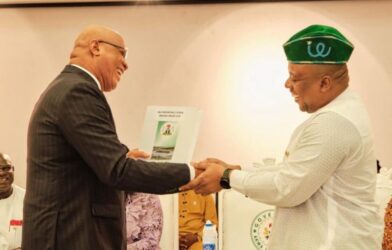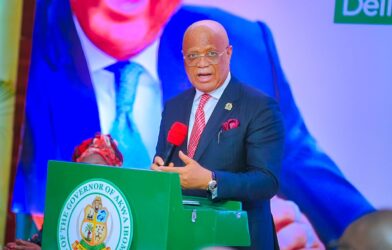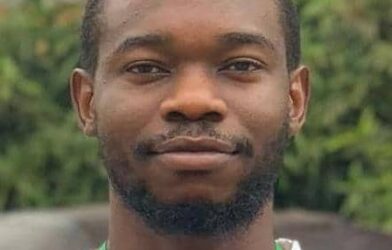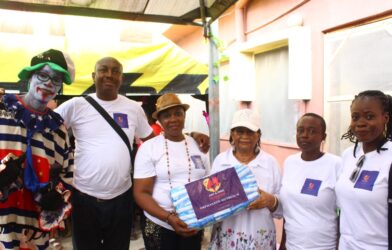“People always want welfare, development, and good governance. As long as you are delivering, people are with you.”
N. Chandrababu Naidu.
In this piece, we are of the conviction that Nigerians are a step away from being clinically pronounced ‘dead’ in terms of commitment to defend democracy and constitutionalism and this threshold will be determined by the quality of the results of the February 2023 general election with specific and unique reference to who emerges as the President of the Federal Republic of Nigeria. Obviously, this is so because like Plato, this writer believes that only a Philosopher king is fit enough to stop the drift towards the obituary of democracy and constitutionalism in Nigeria.
But if truth be told, the death of democracy and constitutionalism in Nigeria is rooted in the 1999 Constitution of the Federal Republic of Nigeria as inherited by the civilian administration in 1999 from the military that oversaw the transition from dictatorship to civilian administration.
It started from the preamble when the framers of the 1999 constitution told a big lie by commencing the framework of the constitution with these words in the preamble thus”We the People of Nigeria.”
This phrase ‘We the People of Nigeria’ could have been better captured if it was framed thus “we the few selected friends of the military coupists.” This is so because the constitution was not written with the overwhelming Democratic approval of the majority of the citizens of Nigeria.
Be that as it may, we will proceed, since the constitution is already foisted on us by hook and crook.
So what are the essential elements of ‘Death’ in terms of constitutionalism and democracy? How do the people become constitutionally and democratically dead?
Going by the extant constitution especially from the chapter two in section 14, the people of Nigeria were informed that democracy is the form of government in practice just as in the same section 14 around subsection (2) (c) the constitution requires that for constitutionalism and democracy to be valid, then the people of Nigeria must participate. However, as I write, the quality of participation of Nigerians in the governance of Nigeria is nil. Only a tiny minority who are the political elites are actually the ones running the show and even when the national economy has virtually collapsed, insecurity has become unprecedented and there is evidently a clear absence of good governance the people of Nigeria do not make contributions to redirect the political office holders about what they the people who are the owners of the sovereignty of Nigeria expect from government. Keeping quiet amidst the unprecedented spread of multidimensional poverty, high costs of living and insecurity is the clearest symptom of what it means to be dead democratically and constitutionally. There have been electricity power shortages in Nigeria for two decades at least but the people of Nigeria are cool about this ugly situation. Petrol is scarce but Nigerians will rather queue up for days to fill up their cars than embark on street protests which is one of the quickest ways to keep government officials on their toes. But in Nigeria, rogue government officials have pushed the citizens to the walls but rather than fight back, Nigerians have broken the walls and have run away with their tails in between their legs like cowards.
But South Africans are alive democratically and constitutionally because as I write, hundreds of people have taken to the streets of Johannesburg to protest a prolonged energy crisis that has caused record power cuts in South Africa, so reports the international media including Al-jazeera television.
We saw that the demonstrators gathered on Wednesday in the centre of the financial capital of Africa’s most industrialised nation to march on the headquarters of the ruling African National Congress (ANC) party.
Most were dressed in blue, the colour of the main opposition party, the Democratic Alliance, which organised the rally.
Some held signs reading, “Enough is enough,” “Power to the people” and “Load shedding is killing jobs.”
The media report says that Scheduled blackouts, known as load shedding, have burdened South Africa for years as the state-owned energy firm Eskom has failed to keep pace with demand and maintain its ageing coal power infrastructure.
But the outages have reached new extremes over the past 12 months. Lights go off several times a day, sometimes for almost 12 hours in total.
The media observed that there was a strong police presence at the protest with authorities saying they expected about 5,000 people to march in Johannesburg, which has a population of about 5.5 million. In Iraq, the citizens are protesting the devaluation of their national currency. In Nigeria the Naira has been in free fall but there is not a single protest. The Central Bank of Nigeria redesigned the Naira note but there is no efficient methodology of getting the populace to exchange their old notes for the redesigned notes, but there is yet no public protest about this inefficiency of the Governor of Central Bank of Nigeria Godwin Emefiele. Most Nigerians behave as though they are free slaves and the government officials as their owners. Aristotle mentioned this aspect of pseudo-citizenship which we will see soon when we get to some citations from his thoughts.
As aforementioned, the root cause of the gradual demise of democratic and constitutional passions amongst Nigerians which are essential qualifications of good citizenship, is deeply rooted in the fundamental intellectual falsehood embedded in the preamble of the constitution donated to Nigerians by military despots. But this is not so with India which has identical colonisation experiences with Nigeria and also became politically independent almost about the same period as Nigeria. A newspaper editorial of one of the dailies in India wrote the following about their democracy.
The editorial on the Indian democracy said thus: “Ruminations on India’s Republic Day may not be faulted for invoking Plato’s Republic.”
The editorial observed that reflections on the tenets of justice formed the core of this Socratic dialogue. The Constitution, it said, which was adopted on January 26, 1950 — the nation’s first Republic Day — is, arguably, the ideal code of justice that was given to the nation.
The editorial said the Indian Constitution laid down the parameters of a just compact between the citizen and the State. However, a little over seven decades later, there are reasons to speculate that several anomalies have crept into this supposedly equitable — thus just — relationship between ruler and subject.
“These creases are manifest in the form of several challenges that the modern republic’s citizens are being confronted with. For instance, there is the barely-disguised nudge on the part of the Supreme Leader — the prime minister — for citizens to accord greater importance to duties over rights. The citizens’ failure to put their duties on a pedestal, the prime minister argued, has led to the weakening of the nation. The discourse on probity is another interesting example in this context”.
The Indian editorial affirmed that Integrity is demanded of ordinary citizens; yet the ruling party thinks nothing of toppling governments formed by Opposition parties by expressly unethical means. Then, holders of constitutional office have argued in favour of the supremacy of Parliament. But does vox populi truly reverberate across its corridors?
The editorial maintained that truncated parliamentary sessions and hasty passage of bills concerning public welfare are hardly emblematic of a citizen’s Parliament. A related dimension is the constant tussle between governors and governments in states that have the Opposition in power. A deterioration in the standards of quality and seamless governance is the inevitable consequence of these undesirable confrontations.
The weakening of certain constitutional principles, it observed, has been the hallmark of the Narendra Modi regime. The Constitution’s inclusive, pluralist vision lies imperilled. What is taking place along with this impoverishment of the foundational vision is a subtle shift in the equilibrium between the people and the republic. The onus of duty seems to rest disproportionately on the citizen even as the State turns its face away from guaranteeing the rights of those on the margins. This Republic Day should be a solemn occasion for citizens to contemplate a new set of responsibilities. Reclaiming the shrinking ground of rights, paving an even-handed contract with the State, and strengthening the public commitment to constitutional imperatives must rank high on this charter of tasks. www.telegraphindia.com”.
As can be seen, even in India whereby the foundation of their constitution is not mired in controversy like it is with the 1999 constitution of Nigeria, there are challenges of poor leadership.
However, the Nigerian scenario is unique in such a way that the people of Nigeria have happily jettisoned their duties as citizens who should ensure that there are mechanisms of checks and balances in the running of government and have gradually embraced voluntary servitude which may result in the death of constitutionalism and democracy.
The question to ask is if Nigerians understand the true meaning of their citizenship.
In the aforementioned interrogatory, we will refer to Aristotle,one of the fathers of Philosophy who argues that to be considered a citizen then you were required to be directly involved in public political affairs. It can definitely be specifically and uniquely interpreted this as Aristotle saying that this is to be a civil duty instead of civil liberty. Aristotle’s argument may be controversial but even the imperfect constitution of Nigeria imposed on the citizens the duty of participation in the government of Nigeria in some forms.
An analyst wrote thus on Aristotle’s assertion aforementioned: “…we can now say that someone eligible to participate in the deliberative and judicial office is a citizen.” This quote is a direct reflection on what Aristotle believed that defined a citizen. I disagree because he failed to include anyone outside of certain white males who could be defined as a citizen-based on their level of birth. Even though it wasn’t explicitly said in this particular quote, it was heavily implied.
“For if something is capable of rational foresight, it is a natural ruler and master, whereas whatever can use its body to labour is ruled and is a natural slave”. Aristotle is saying the exact opposite of what Plato was saying about independent thoughts. Instead of acknowledging that there is a massive mob mentality issue, he just says it is natural for some people to be slaves.
“For anyone who, despite being human, is by nature not his own but someone else’s is a natural slave. And he is someone else’s when, despite being human, he is a piece of property that is a tool for action that is separate from its owner.”
Aristotle acknowledges the fact that slaves “may” be human but this in itself is just ethically and morally wrong to say otherwise. He says that slaves “may” be humans; they are human enough to do free labour, and be considered property, but not quite human enough to be considered a citizen.
Although like the analyst stated, I found this revolting. Nonetheless, this was a common thought in Ancient Greece. But in Nigeria the refusal of the citizens to embrace protests against corruption in Government makes it look like they are voluntary slaves.
As established by a writer who critiqued the position of Aristotle on citizenship stated that Plato’s ideas of citizenship are more appealing because he believes that to be a citizen you must contribute to society. This is still relevant in today’s society because people believe that you are a citizen by birthright while others believe that you can be a citizen as long as you contribute to your state, the analyst stated. Just like the analyst said, I disagreed with Aristotle because his beliefs of birthright citizenship do not resonate with me. I like the analyst in the piece being cited, agreed with Plato because of his beliefs about contribution making you a citizen is more important to a society’s progression. If we were not debating over what makes a citizen we could live in a more harmonious world, the analyst concludes. edubirdie.com”.
Nigerians need not permit the demise of democracy and constitutionalism and this can be prevented only by becoming active citizens and participating actively in the next general election coming up next month.
Nigerians need to preview the antecedents of politicians asking them for votes. Nigerians should reject moneybags who want to mortgage their consciences by buying their votes. In some States, politicians have already paid potential voters peanuts and have taken away the vitals of their permanent voters cards so as to manipulate the outcome of the election. The independent National Electoral Commission said it will not permit the purchasing of voters but it is not known how INEC intends to achieve that given the vulnerability of millions of Nigerians who are ever ready to embrace voluntary servitude by selling their votes for a small bag of salt and some half a dozen indomie noodles from corrupt minded and violently lawless politicians who have held the Country as a hostage of their brigandage and political terrorism. CBN redesigned Naira notes abd said this will stop votes buying. But as soon as the new notes were distributed to deposit banks, politicians paid the deposit banks to hijack these new notes whilst the rest of the people are struggling to have access to the new notes with just few hours to the deadline.
Emmanuel Onwubiko Writes From Abuja.












Comments are closed